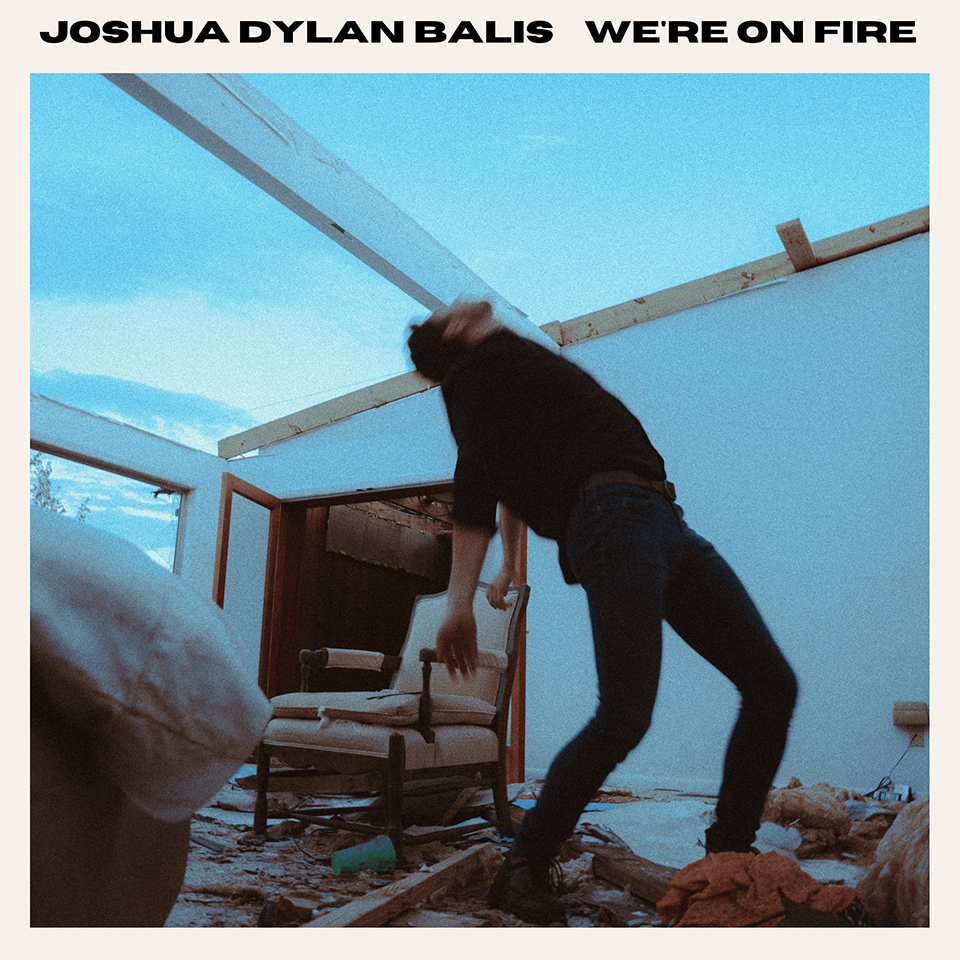When Joshua Dylan Balis’ released “Stories,” the first single from his latest album We’re on Fire, he intended it as a gift to the friends and family he left behind in Texas when he left Texas for Nashville in September of 2019, but it was also the song he could see himself using
to open all his shows:
How’s everybody doing tonight?
Ain’t it wonderful just being alive?
How’s everybody doing tonight?
I’d like to thank you all for giving your time–
‘Cause we’re only given so much time to spend.
“It’s an acknowledgement that I can play and play and play, but the audience makes all the difference and opens up the music,” said Balis. He admitted, though, that the decision about which singles to release is a different challenge from deciding which songs to place on an album and in what order.
As the second single, Balis released the title track from the album “We’re on Fire,” a song inspired—literally and metaphorically—by a story of its own. He said he had faced emergency situations and close calls before he found himself on the seventeenth floor of an apartment building when a fire broken out, but this experience had a different effect on him. With the smoke below him, the elevator shut down, and a locked gate blocking the stairwell exit, Balis said what may have been a few minutes of danger felt like forever. Shortly afterwards, he said the sound of downtown demolition spooked him, sending him out walking to calm his fears. This new album is infused with images of heat and fire, but even more with reminders that time is limited.
“From time to time, anybody in the arts, taking whatever job they must to make the money to keep their dream alive, gets tired,” he said, “but that close call was such a reminder that time is precious and there’s nothing else I’d rather be doing. Life is short; it’s cliché, I know, but I definitely had a reminder in a real tangible way.”
Balis’ decision to pursue a career in music was shaped by his father Danny Balis’ career as a bass player in Dallas. His father gave him his first guitar but remained hands off, letting his son decide on his own about pursuing a career in music. Balis says some of his earliest memories involved watching his father’s band play.
He was just ten when his father’s band’s album release at Dallas’ Granada Theatre was a sellout. “l couldn’t believe it,” he said. “Music was always around, but my love for it was also my own.”
For Balis, music was never Plan B. “Music had already taken over all of my life and all of my energy. My entire life was built designed around being able to make music in the mornings, record it, and have enough money to get by—living in cheap apartments just outside of town, working with little as humanly possible while having enough to pay the bills,” said Balis. He even tried insurance sales for about six months.
“I came into the office early one morning, and everyone was in the meeting room, which I though was odd,” he said. They called him in and said, “Josh, we all love you, but do you really want to be here?” He realized that he didn’t, that he had collected those paychecks with no sense of reward.
He told himself, “If this is what I get for trading all that time, it’s not enough. Once you really just accept it, I think you become a lot more free.”
After releasing an EP he called Modern Gospel, despite having nothing gospel on the entire recording, he tried playing with a band for a while. A degree of stage fright contributed to the motivation to be a part of a band. He confided that some early cell phone footage captured his leg shaking while he was onstage in Dallas.
“It was just easier to hide in the mix,” he said. “When you’re young and alone and want to be a musician for a long time, that often means sitting alone in a room writing songs. When I was in front of people, I’d think, ‘Oh, my fingers don’t work.’ But it’s like anything else,” he said, “You do it again and again and again.”
The band worked recording an album for two and a half years.Then when it was finished, the band fell apart.
“I knew music was what I wanted to do,” Balis said, “but other band members admitted they didn’t have the energy to stay broke and on the road.” He also had solo material that didn’t work for the band. “I realized how much of myself I had rejected to conform to this group activity,” he said.
Needing to make something happen, he moved to Nashville in September 2019. When COVID shut things down, he considered moving home to Texas but decided to stay and find his center. While he knew some people said they had never felt more prolific, he admits that during the period of isolation, “it was almost like the well had just run dry. I was bored and restless, and I didn’t have anything to draw from. There was no life, no fuel. I didn’t meet anybody new. I didn’t go anywhere. I couldn’t even find subject matter that felt worth writing about.” Eventually, he wrote a few songs that will go on his next record but said, “For the most part, I just wanted to get out and run.”
For We’re on Fire, on Dallas label State Fair Records, he worked through decisions about which songs to include on the album. His uncle offered support for the recorded but insisted he include two songs from his earlier project, “The Long Walk Home” and “When You Were Mine.” Balis was resistant at first, but when he took those tracks into the studio and wrapped a rhythm section around them, they fit the album feel. They also became an important part of his live show.
While the label’s marketing campaign considered which singles to release, in order to build a narrative arc, Balis noted that album placement is a different challenge.
“You never know how zongs are going to feel until they’re recorded,” he said. “I had all of these songs written and I had an album order saved in my phone, which I thought gave them an arc, but when we got into the studio, a song might take on a completely different life and fit in a different place.” He said he thought the song “Coming of Age,” was going to have more of a “psychedelic trope” but it became more of an up-tempo rock song that belonged up front.
Balis also recognizes that some of the songs reach a live audience in a more personal way. “Grandmother,” one track he considers the most intimate track on the record, is also the most stripped down. In live shows, after playing rock sets, he will include “Grandmother.”
“People come up to me afterwards and that’s the song they say brought a tear to their eye.
They say it put them back into a story of their own, that place with someone they cared about and loved. It was personal experience, but it’s such a universal thing,” Balis said. He family musical influence can also be traced to his grandmother, who grew up in West Texas during the Dust Bowl and loved country music.
“She was a backup singer for Patsy Cline when she and Elvis and a few other stars were playing on the Hayride circuit all through the South. There are a couple of great old recordings of her singing.They have an old school sound coming through old radio microphones.” He added, “My dad’s has an early memory of meeting Elvis outside one of those shows and calling him Mr. Parsley.”
Balis’ songwriting influences can be traced to a number of sources, both musical and poetic, such as Bob Dylan and Tom Petty. Noting the influence of Leonard Cohen, Balis said he considers himself more of a songwriter than a poet.
“There’s never been a time where I was without an instrument,” said Balis, “but [Cohen] was a novelist and poet for a decade before he finally put some music to his guitar. He also never really seemed to figure out the studio. They came along and picked up his songs and found better ways to record them. I think he almost went in there with a literary attitude. He recites a lot of his songs more than he sings them. He was a free agent, a character who had fascinating life. I love that he followed his instincts and never let anything hold him back.”
Discussing his own influences, Balis said, “I’ve found myself returning to the same wells again and again. I’m having a little revival with Townes [VanSandt] right now. My dad loved him, so I heard him growing up all the time, but I think it helps if you’ve got some time and some suffering, so I’m reinterpreting his life and his songs. I’m hearing the lyrics in a completely different way. They felt so abstract when I was a kid, but now it all seems so grounded in reality.”
Balis also found influences in reading from such classics as Dostoevsky to some old westerns, like Lonesome Dove. He also re-read everything from Bukowski during the pandemic.

Balis started playing live shows again in March of ‘21 when things start opening back up. Some businesses downtown and some bars, he noted, were putting shows back on, but people were nervous about posting about them.
“It was still underground. It was cool to hear music and have a beer with strangers–something that we all had forgotten about,” he said.
With a Florida run this summer, Balis expects to return to Tennessee in September to play shows during AmericanaFest. He also anticipates a three-week tour of Europe with sone other artists on the State Fair label. His most recent singles, the upbeat summer favorite “Lydia” and “Silver Linings,” with its video filmed in a Fort Worth stockyard back on Balis’ home turf, continue to get listener and viewer attention.
Currently in a residency at the Hutton Hotel’s Analog, Balis continues writing songs with an eye on the next project, aware there is only so much time. Asked about his flair for storytelling, he said, “My favorite forms of fiction are used as a vehicle to tell the truth, and I think that’s very possible. Artists do whatever we have to do to find some sense of meaning–whether that’s telling a flat-out story or reading a transcript of an event in concrete bullet points. It’s more of a dream–like a “Poncho and Lefty” type song where the truth of living comes through in in the best way possible. I guess songs just come the way they want to come, and I have to be grateful when that truth arrives.”

